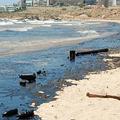 以色列7月13和15日對黎巴嫩發動空襲,擊中貝魯特南部一座基業(Jiyyeh)電廠的儲油庫,導致約1萬公噸重油外溢至地中海,沿著黎巴嫩海岸線擴散了80公里,受風力影響,漏油正持續往北擴散,逐漸威脅敘利亞的沿岸地區。
以色列7月13和15日對黎巴嫩發動空襲,擊中貝魯特南部一座基業(Jiyyeh)電廠的儲油庫,導致約1萬公噸重油外溢至地中海,沿著黎巴嫩海岸線擴散了80公里,受風力影響,漏油正持續往北擴散,逐漸威脅敘利亞的沿岸地區。
7月26日,黎巴嫩政府向聯合國秘書長和安理會主席求援,總部位於肯亞奈洛比的聯合國環境規劃署旋即協助污染區成立清潔團隊,清理油污。
黎巴嫩環保部官員對IRIN(聯合國人道關懷和媒體平台)表示,至少需要一年才能徹底清理海岸,預估花費為1億3,000萬美元。
更令人擔憂的是,基業電廠7月27日發生大火,若延燒至另一個裝有1萬5,000公噸燃油的儲油庫,對地中海域的油污災情無疑雪上加霜。大火導致濃煙黑雲籠罩貝魯特和近郊天空,更造成空氣污染。
官員提醒附近居民將門窗緊閉,並遠離油槽,以免被濃煙所嗆,造成呼吸和皮膚傷害。
環境規劃署執行長史坦能(Achim Steiner)表示,以色列軍對機場和海港空襲行動,對居民和環境的衝擊也讓人擔心,倘若基礎建設地區發生有毒化學物質外洩,將直接衝擊當地居民和增援工作人員的生命安全。
目前得到聯合國國際海事組織(IMO)和環境署充分授權的地中海地區海洋污染應變中心(REMPEC),每日提供技術指導,協助黎巴嫩環境部回收海面油污,並向保護地中海免於污染的巴塞隆納公約簽署國募集各項專業器材、人力和資金。
一旦戰區敵意稍緩,應變中心將集結專家之力協助清理油污;此刻,應變中心已商請「地中海援助中心」(MAU)直接聯繫、動員當地污染控制中心。
史坦能強調:「我們必須關注地中海油污對海洋生態短期和長期衝擊,包括生物多樣性,還有許多人賴以維生的漁業和觀光業。」這場海洋災難也已禍及黎巴嫩沿海瀕臨絕種的綠蠵龜和黑鮪魚。
Tons of heavy fuel oil spilled by the Israeli bombing of a power utility south of Beirut has spread along 80 kilometers (50 miles) of the Lebanese coastline and is threatening the Syrian coast as well. About 10,000 metric tons of oil spilled into the Mediterranean Sea after air strikes on July 13 and 15 hit fuel tanks at the Jiyyeh power plant, and winds have since pushed the oil northwards.
The United Nations Environment Programme (UNEP), based in Nairobi, is helping to organize a cleanup team after the government of Lebanon appealed for help to the UN Secretary-General and the President of the Security Council July 26.
Officials at Lebanon's environment ministry told IRIN, a UN humanitarian news and information service, that the cleanup operation will take at least a year to complete and estimated the cost at more than US$130 million.
There are fears that more oil could spill into the Mediterranean Sea because a fire at the Jiyyeh facility that started Thursday now threatens a undamaged tank that contains 15,000 metric tons of oil. A thick cloud of black smoke from the fire has polluted the air over Beirut and its suburbs.
Officials have warned people who live near the sea to keep their windows closed and stay away from the oil as the fumes can cause skin and breathing problems.
UNEP Executive Director Achim Steiner said he is concerned about the humanitarian and environmental impacts linked with strikes on other infrastructure like airports and sea ports and industrial facilities, which may be leaking toxic chemicals into the environment putting local populations and aid workers at risk.
REMPEC, administered by the UN International Maritime Organization and part UNEP's Regional Seas Network, is giving daily advice to the Lebanese Ministry of the Environment on how to tackle the oil slick. REMPEC has requested assistance for equipment, personnel and funding from governments who are parties to the Barcelona Convention, the regional Mediterranean environment treaty.
The Center is putting together a team of experts to assist with the cleanup when hostilities cease and has activated its Mediterranean Assistance Unit to mobilize key pollution control centers in the region.
"We must also be concerned about the short and long term impacts on the marine environment,"
Steiner said, "including the biodiversity upon which so many people depend for their livelihoods and living via tourism and fishing." The spill threatens Lebanon's endangered species such as green sea turtles and blue fin tuna.



